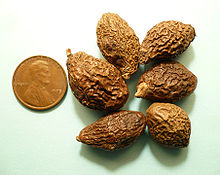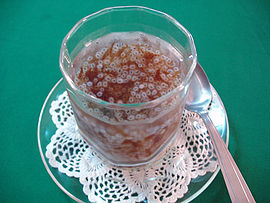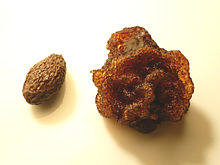- Sterculia lychnophora
-
Sterculia lychnophora Hance 
Dried Sterculia lychnophora seeds Scientific classification Kingdom: Plantae Division: Magnoliophyta Class: Magnoliopsida Order: Malvales Family: Sterculiaceae Genus: Sterculia Species: S. lychnophora Binomial name Sterculia lychnophora
HanceSterculia lychnophora Hance is a species of tree in the genus Sterculia, native to mainland Southeast Asia.
Description
The tree grows to a height of 25-30 meters. The dried seeds are the size of an adult's fingertip; they are brown and have coarse skin.
Culinary and medicinal use
 A glass of hột é - hột lười ươi, a Vietnamese cold, sweetened drink containing basil seeds (hột é) and poontalai seeds (hột lười ươi), both ingredients which swell up when added to water. The basil seeds are the small, round objects that look like frog eggs and the poontalai seeds are the red gelatinous mass.
A glass of hột é - hột lười ươi, a Vietnamese cold, sweetened drink containing basil seeds (hột é) and poontalai seeds (hột lười ươi), both ingredients which swell up when added to water. The basil seeds are the small, round objects that look like frog eggs and the poontalai seeds are the red gelatinous mass.
The flesh surrounding the dried seeds swells to eight times its original volume when soaked in water, forming an irregularly shaped, reddish gelatinous mass. After being soaked and the seed kernel removed, the flesh is mixed with granulated white sugar, ice, and soaked basil seeds, and drunk as a cooling drink in Vietnam, Thailand, and Cambodia. They are sometimes also used, along with other ingredients, in sweet, cool soups similar to the Chinese tong sui.[1]
The seeds are also called poonterai, poontalai, pangdahai (胖大海), samrong, hột lười ươi, hạt lười ươi, đười ươi, mak chong, or malva nuts. They are used in traditional Chinese medicine.
The species is also given as Scaphium macropodum or Scaphium lychnophorum.
In China, the "sterculia lychnophora" or "poontahai" is used in tea as well by mixing with other ingredients such as sugar candy, red date, haw, liquorice, chrysanthemun flower, lilyturfroot, and jasmine tea. The advantage of such tea is believed to reduce the "hotness" of the body, and nurture the body.
According to the Chinese medicine, the use of "sterculia lychnophora" is to remove heat from the lung, to cure sore throat, to counteract toxicity, and to relax the bowels. Therefore, when a person has symptoms such as hoarseness of voice, dry cough, and sore, dry throat due to heat in the lung; constipation with headache and bloodshot eyes should consume the Sterculia lychnophora by putting it into boiling water.
Although it possesses medicinal properties, care must be taken with its consumption. Avoid boiling more than 3 seeds per drink. Overconsumption symptoms include white watery phlegm, nausea, coughing, and swollen tongue. People with frequent digestion problems and abdominal pain or diarrhea should avoid it entirely.
External links
Categories:- Vietnamese ingredients
- Cuisine stubs
Wikimedia Foundation. 2010.

